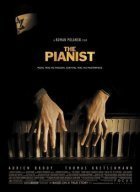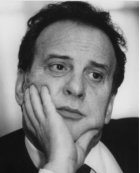
The Pianist Page #17
Suddenly:
YOUNG SS MAN:
Halt!
The column halts before a young SS man, wild-eyed, with
his sleeves rolled up and wielding a pistol. He talks
excitedly to the policemen then turns, walks along the
column dividing them up: some men to the right, others,
seven of them, to the left. Benek he orders to the left,
Szpilman to the right.
Young SS man turns to those on the left.
YOUNG SS MAN:
Lie down!
Terrified, they obey. He stands over them and, one by one,
shoots them. When he comes to Benek, the seventh man, his
pistol runs out of ammunition. He changes the clip, shoots
Benek and marches off.
EXT. BUILDING SITE, OUTSIDE GHETTO - DAY
Szpilman, bent almost double, carries a hod on his back
piled with bricks. He is mounting a wooden ramp that runs
up beside scaffolding on a small building site where an
extra floor is being added to a house. There are Polish
workers, too, who don't, of course, wear armbands as the
Jews do. There's a wooden hut serving as a store on the
site.
Halfway up the ramp, Szpilman hears someone whistle. He
stops, turns to see, at the bottom of the ramp, Majorek,
smiling and giving a discreet wave.
Later:
Szpilman and Majorek sip gruel out of mugs. They sit apart
from the others who are also taking a break.
SZPILMAN:
How long have you been here?
MAJOREK:
Since last night. I was pleased to
see you.
Brief silence.
MAJOREK:
They're going to start the final
resettlement now. We know what it
means. We sent someone out. Zygmunt.
A good man. His orders were to
follow the trains out of Warsaw.
He got to Sokolow. A local
railwayman told him the tracks are
divided, one branch leading to
Treblinka. He said every day freight
trains carrying people from Warsaw
forked to Treblinka and returned
empty. No transports of food are
ever seen on that line. And
civilians are forbidden to approach
the Treblinka station. They're
exterminating us. Won't take them
long. We're sixty thousand left.
Out of half a million. Mostly young
people. And this time we're going
to fight. We're in good shape.
We're organised. We're prepared.
SZPILMAN:
If you need help...
Whistle blows.
A little later:
Szpilman again mounting the ramp with a hod full of bricks
on his back. The noise of airplanes overhead.
EXT. SKY - DAY
A swarm of Russian bombers. Anti-aircraft fire. Puffs of
exploding shells.
EXT. BUILDING SITE - DAY
The workers look up. So does Szpilman and, as he does so,
the bricks slide off his hod, crashing to the ground below.
ZICK-ZACK
You!
An SS man, ZICK-ZACK (his nickname), with a whip, approaches
Szpilman.
ZICK-ZACK
Here!
Szpilman goes to him. Enraged, Zick-Zack grabs him by the
hair and presses his head hard between his thighs and then
beats him mercilessly.
ZICK-ZACK
(with every stroke,
hissing through
clenched teeth)
Und-zick! Und-zack! Und-zick! Und-
zack!
After a dozen or so strokes, Szpilman falls forward and
lies in the dirt. Zick-Zack nods, satisfied.
ZICK-ZACK
Get him away from here.
Two Poles, without armbands, one of them Bartczak, drag
him away.
Bartczak and the other man help Szpilman to his feet.
BARTCZAK:
Hope you played the piano better
than you carry bricks.
POLISH WORKMAN:
He won't last long if he goes on
like this.
BARTCZAK:
I'll see if I can get him something
better.
INT./EXT. STORES AND BUILDING SITE - DAY
Winter. Rain. Cold. The store, a wooden hut, contains wood,
nails, tools, paint, metal brackets.
Szpilman sits at a table, where a line of workers has
formed. Szpilman makes a record in a ledger of the tools
each worker takes out on the site.
A worker puts his head into the store.
WORKER:
(hissing)
Trouble.
A GERMAN VOICE:
Assemble! Fall in! Only the Jews!
Poles go on working! Only the Jews!
Poles go on working!
The Jewish workers start to assemble on the site in
haphazard ranks as an SS Captain strides in.
The SS Captain, with much jollity and jokes, hops up on to
scaffolding and stands, beaming broadly, surveying the
workers.
SS CAPTAIN:
(in English)
I have important and good news for
you. There are rumours circulating
that resettlement measures are
again going to be taken.
Translation
Translate and read this script in other languages:
Select another language:
- - Select -
- 简体中文 (Chinese - Simplified)
- 繁體中文 (Chinese - Traditional)
- Español (Spanish)
- Esperanto (Esperanto)
- 日本語 (Japanese)
- Português (Portuguese)
- Deutsch (German)
- العربية (Arabic)
- Français (French)
- Русский (Russian)
- ಕನ್ನಡ (Kannada)
- 한국어 (Korean)
- עברית (Hebrew)
- Gaeilge (Irish)
- Українська (Ukrainian)
- اردو (Urdu)
- Magyar (Hungarian)
- मानक हिन्दी (Hindi)
- Indonesia (Indonesian)
- Italiano (Italian)
- தமிழ் (Tamil)
- Türkçe (Turkish)
- తెలుగు (Telugu)
- ภาษาไทย (Thai)
- Tiếng Việt (Vietnamese)
- Čeština (Czech)
- Polski (Polish)
- Bahasa Indonesia (Indonesian)
- Românește (Romanian)
- Nederlands (Dutch)
- Ελληνικά (Greek)
- Latinum (Latin)
- Svenska (Swedish)
- Dansk (Danish)
- Suomi (Finnish)
- فارسی (Persian)
- ייִדיש (Yiddish)
- հայերեն (Armenian)
- Norsk (Norwegian)
- English (English)
Citation
Use the citation below to add this screenplay to your bibliography:
Style:MLAChicagoAPA
"The Pianist" Scripts.com. STANDS4 LLC, 2025. Web. 15 Jan. 2025. <https://www.scripts.com/script/the_pianist_72>.



Discuss this script with the community:
Report Comment
We're doing our best to make sure our content is useful, accurate and safe.
If by any chance you spot an inappropriate comment while navigating through our website please use this form to let us know, and we'll take care of it shortly.
Attachment
You need to be logged in to favorite.
Log In